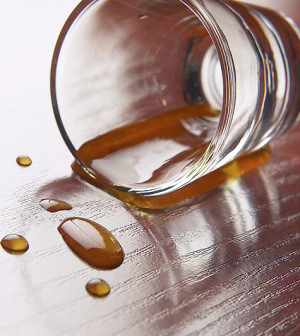- 7 Best Breads for Maintaining Stable Blood Sugar
- Gelatin vs. Collagen: Which is Best for Skin, Nails, and Joints?
- The Long-Term Effects of Daily Turmeric Supplements on Liver Health
- Could Your Grocery Store Meat Be Causing Recurring UTIs?
- Are You Making This Expensive Thermostat Error This Winter?
- Recognizing the Signs of Hypothyroidism
- 10 Strategies to Overcome Insomnia
- Could Artificial Sweeteners Be Aging the Brain Faster?
- Techniques for Soothing Your Nervous System
- Does the Water in Your House Smell Funny? Here’s Why
People’s Beliefs on Drunk Driving May Change When They’re Drunk


THURSDAY, Sept. 12People who believe it’s wrong to get behind the wheel while drunk may change their minds after actually becoming intoxicated, a new study suggests.
Analyzing 82 young adults, researchers from the University of Missouri compared their attitudes and willingness to drive drunk on two separate occasions: when they were sober and after drinking moderate amounts of alcohol.
The magnitude of the disparity startled study author Denis McCarthy, an associate professor of psychological sciences.
“We all probably know people who make good decisions about lots of things when they’re sober, but put four or five beers in them and they make bad ones. So that part wasn’t surprising,” McCarthy said. “I was surprised, however, that it was such a big effect over and above their sober beliefs.”
Funded by the National Institute of Alcohol Abuse and Alcoholism, the study was published online Sept. 12 in the journal Alcoholism: Clinical and Experimental Research.
About one-third of all fatal vehicle crashes in the United States each year involve an alcohol-impaired driver. In 2010, that translated to more than 10,000 preventable alcohol-related traffic deaths, according to the National Highway Traffic Safety Administration.
Numerous public-health campaigns contributed to a drop in drunk driving fatalities from the early 1980s to the mid-1990s, but those numbers have stayed relatively stable since.
One potential factor, according to McCarthy’s team, is that although people may know that drinking and driving is a bad idea, those sober beliefs may go out the window after a few drinks.
For their study, the researchers recruited 43 men and 39 women (average age 22) to attend two laboratory sessions. At one, participants consumed a moderate amount of alcohol and gave their opinion on how dangerous it is to drink and drive. They also rated their willingness to drive “right now” at various breath alcohol concentrations (BrAC).
At the second session, participants remained sober and appraised the danger of driving at a hypothetical, illegal BrAC.
For both genders, the difference in perception about the dangers of drunk driving was most pronounced as drinkers came down from their peak BrAC levels. They felt it was safer to drive in that circumstance than they did when they were sober and appraising drinking and driving.
“It’s a good thing to keep in mind that your judgment when intoxicated is going to be different than your judgment the rest of the time,” McCarthy said. “We showed that there are bigger effects on the descending limb of the BrAC curve, which is important because that’s when people are typically driving home. People on the way down [the BrAC curve] later in the evening are worse judges of how impaired they are, and they’re more impaired than they think.”
Jan Withers, national president of Mothers Against Drunk Driving (MADD), praised the study, saying it “is strong reinforcement of what we already know.”
“MADD always says that the safest course of action is to decide before you ever have your first drink how to get home with a designated non-drinking driver,” Withers said. “You should decide as far in advance as possible.”
McCarthy said the timing of messages that discourage drunk driving is important. He said he hopes further research will lead to efforts that help sway perceptions about the dangers of drunk driving either just before people drink or while they’re imbibing.
“One of the reasons I do research like this is that drinking and driving is what I care about in terms of societal improvement,” he said. “It’s a behavior I think we can get rid of if we try hard enough.”
More Information
MADD offers more information on drunk driving.
Source: HealthDay
Copyright © 2026 HealthDay. All rights reserved.










